Your cart is currently empty!
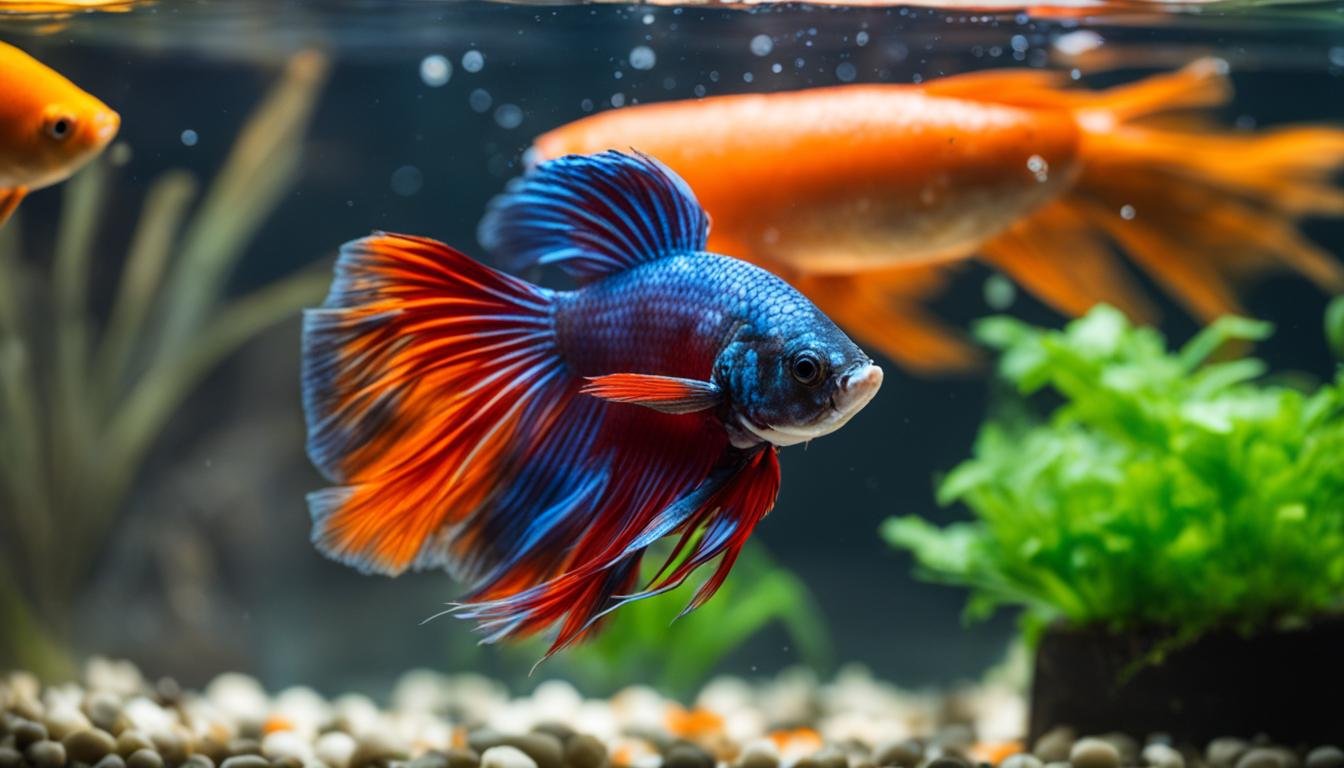
Answered: Can Betta Fish Eat Carrots? Your Guide to Betta Diet
Greetings, fellow betta fish enthusiasts! Today, we’re diving into the fascinating world of betta fish diet and exploring whether these magnificent aquatic creatures can enjoy a delicious treat like carrots. As responsible caretakers, it’s crucial to understand what constitutes a healthy and balanced diet for our finned friends. Let’s explore the topic together!
Key Takeaways:
- While bettas are primarily carnivorous, they can tolerate some vegetable matter in their diet.
- Carrots can be fed to betta fish as a treat, but in small amounts to avoid digestive issues.
- Commercial betta fish foods provide all the necessary nutrients for a balanced diet.
- Feeding bettas in moderation and establishing a routine is essential for their well-being.
- Consulting a veterinarian or knowledgeable pet store employee can provide specific dietary recommendations for your betta fish.
About Betta Fish
Betta fish, also known as Siamese fighting fish, are popular freshwater aquarium fish that originate from Asia. These vibrant and beautiful fish are known for their long, flowing fins and unique colors. They are solitary creatures and thrive in small aquariums.
When it comes to their diet, betta fish are primarily carnivores. In the wild, they feed on insects, small invertebrates, and larvae. It is important to replicate their natural diet in captivity to ensure they receive the necessary nutrients for optimal health and well-being.
Commercial betta fish foods are readily available and formulated to meet the nutritional needs of bettas. These foods often consist of brine shrimp, bloodworms, and other small organisms that bettas would typically feed on in the wild. Feeding your betta fish a high-quality commercial food is one of the best ways to ensure they receive a balanced and nutritious diet.
Nutrition for Betta Fish
Bettas require a diet that is high in protein. This is because they have a short digestive system and need easily digestible food to thrive. In addition to commercial betta fish foods, you can also supplement their diet with live or frozen foods such as brine shrimp, daphnia, and bloodworms. These foods provide additional variety and enrichment for your bettas.
While bettas primarily consume animal protein, they can tolerate small amounts of vegetable matter in their diet. However, it is important to note that vegetables should only be offered as occasional treats and not as a primary source of nutrition. Some safe options for vegetable treats include blanched peas and small pieces of cucumber or zucchini.
When feeding your betta fish, it is essential to practice portion control. Overfeeding can lead to obesity and other health issues. A general guideline is to feed your betta fish as much as they can consume in about 2-3 minutes, twice a day. Observing your betta’s behavior and adjusting their feeding schedule accordingly can help ensure they receive the right amount of food.
The 4 Human Foods You Can Feed Betta Fish
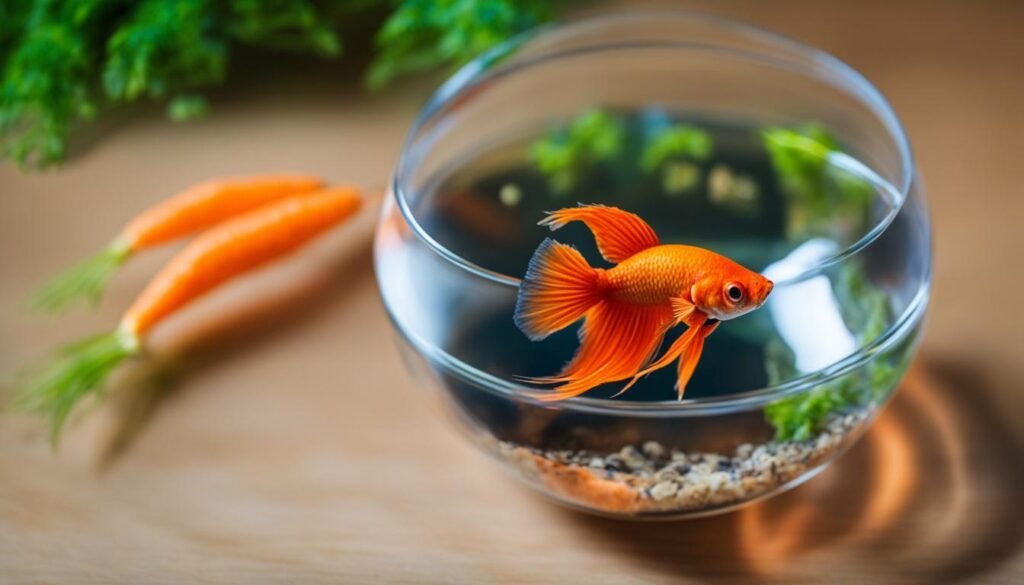
While bettas are primarily carnivorous, there are a few human foods that can be fed to them. It’s important to remember that these should only be offered as occasional treats and not as a staple part of their diet. Here are four human foods that you can feed your betta fish:
1. Shrimp
Shrimp is a great source of animal protein for bettas. You can offer small pieces of cooked shrimp as a treat for your fish. Just make sure to remove any shells and tails before feeding. Shrimp should be given in moderation to prevent overfeeding and digestive issues.
2. Chicken
Cooked, boneless, and skinless chicken can also be fed to betta fish as a treat. Cut the chicken into small, bite-sized pieces and offer it to your betta sparingly. Remember to remove any seasoning or spices that may be harmful to your fish.
3. Egg Yolk
Egg yolk is another human food that can be given to bettas. Hard-boil an egg and remove the yolk. Mash the yolk into tiny pieces and feed it to your betta fish. Egg yolk is rich in protein and can be a nutritious treat for your fish.
4. Pork
Pork can be offered to bettas in very small amounts. Cook a small piece of lean pork and cut it into tiny, fish-sized portions. Feed it to your betta sparingly, as pork is high in fat and can be difficult for bettas to digest.
Can Betta Fish Be Fed Fish Flakes?
When it comes to feeding betta fish, one common question that arises is whether fish flakes are a suitable option. The answer is yes, betta fish can be fed fish flakes that are specifically formulated for their dietary needs. Fish flakes designed for bettas usually have a high protein content, which is essential for their nutrition.
However, it’s important to note that bettas are primarily carnivorous and have specific nutritional requirements. While fish flakes can be a convenient option for feeding bettas, they should not be the sole source of nutrition. It’s recommended to include a variety of foods in their diet to ensure they receive a well-rounded nutritional profile.
Additionally, it’s crucial to avoid feeding bettas fruit as part of their diet. While fruit is a common human food, it is not suitable for betta fish. Bettas do not naturally consume fruit in the wild, and it may not provide the necessary nutrients they need to thrive. It’s best to stick to food options that are specifically formulated for betta fish and meet their nutritional requirements.
Summary:
- Betta fish can be fed fish flakes that are formulated for their dietary needs.
- However, fish flakes should not be the sole source of nutrition for bettas.
- It’s important to include a variety of foods in their diet to ensure they receive the necessary nutrients.
- Fruit is not suitable for betta fish and should be avoided.
How Much Should You Feed Betta Fish?
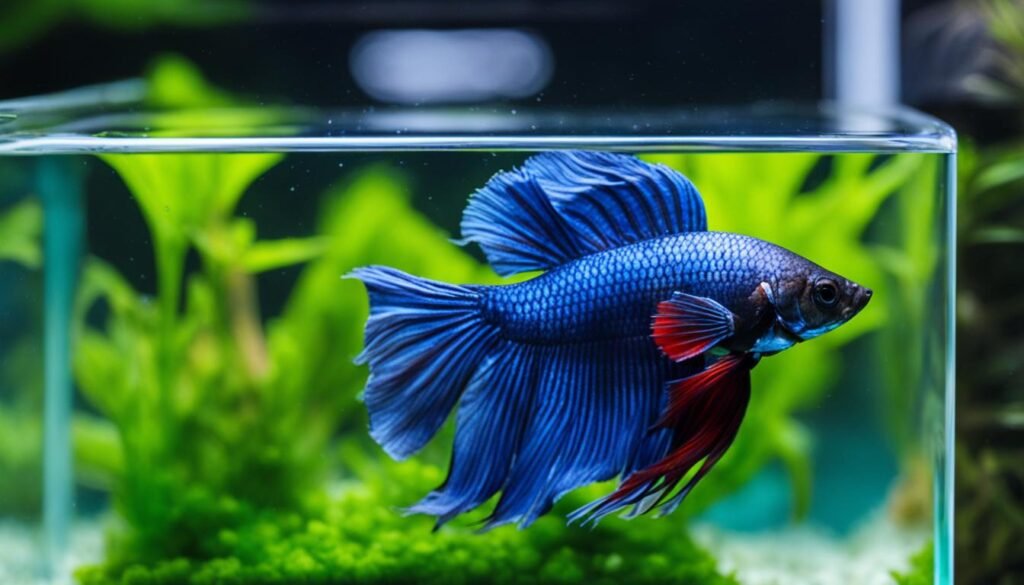
Feeding betta fish the right amount of food is essential for their health and well-being. Overfeeding can lead to obesity and digestive issues, while underfeeding can result in malnutrition and stunted growth. It’s important to establish a feeding routine and provide the appropriate portion size for your betta.
Portion Control and Frequency
When it comes to feeding betta fish, it’s best to offer small meals multiple times a day rather than one large meal. This mimics their natural feeding habits and helps prevent overeating. Aim to feed your betta fish as much food as they can consume in 3 minutes, twice a day. This allows them to eat their fill without leaving excess food that can dirty the water.
Observing Your Betta’s Behavior
While general guidelines can help you determine the right amount of food to feed your betta, it’s also important to observe their behavior and adjust accordingly. If your betta eagerly consumes all the food within the 3-minute timeframe and doesn’t show signs of bloating or constipation, you can consider increasing the portion slightly. On the other hand, if your betta leaves uneaten food behind or shows signs of overeating, you may need to reduce the portion size.
Balancing the Diet
In addition to controlling the portion size, it’s crucial to provide a balanced diet for your betta fish. Betta fish are primarily carnivorous, so their diet should consist of high-quality betta fish pellets or flakes that are rich in protein. These commercial foods are formulated to provide all the essential nutrients your betta needs. While bettas can tolerate some vegetable matter, it should only be offered as occasional treats and not as a staple part of their diet.
Conclusion
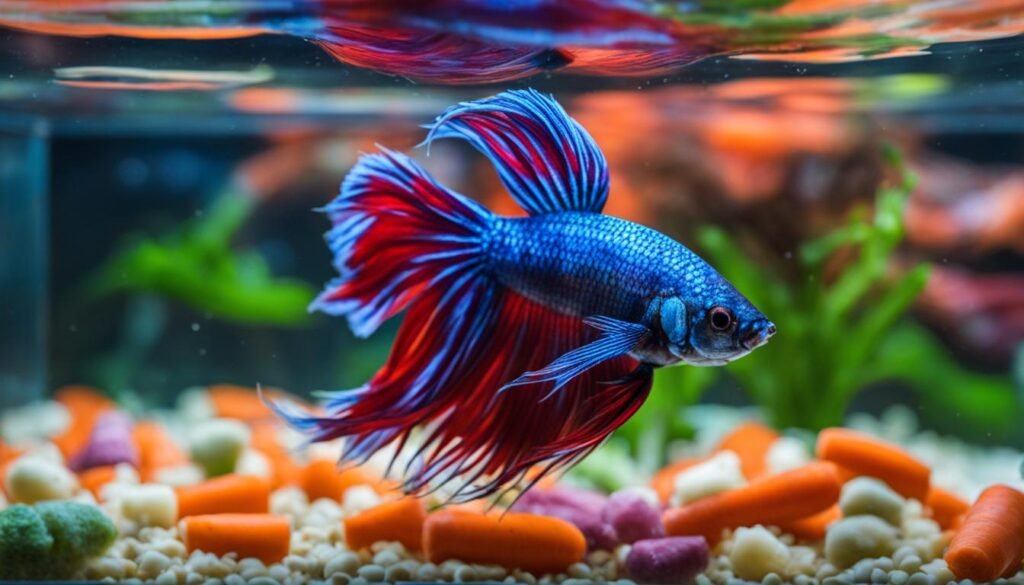
Betta fish, also known as Siamese fighting fish, can indeed eat carrots as part of their diet. While bettas are primarily carnivorous, they can tolerate some vegetable matter in their diet. Carrots are a nutritious vegetable that can be offered to bettas as a treat. However, it is crucial to feed bettas in moderation to prevent digestive issues and overfeeding. Commercial betta fish foods are specially formulated to provide all the necessary nutrients, but incorporating small amounts of carrots and other vegetables can add variety to their diet.
Feeding bettas a balanced diet is essential to keep them healthy. It is recommended to feed bettas as much food as they can eat in 3 minutes, twice a day. Smaller meals provided multiple times a day are more beneficial than one large meal. Portion control is necessary, as bettas in the wild don’t eat daily. Establishing a feeding routine and monitoring your betta’s health are key to ensuring they receive the appropriate amount of food.
When offering carrots or any other vegetables to bettas, make sure to cut them into small, bite-sized pieces. This will make it easier for the bettas to consume and prevent choking. Additionally, it is important to consult a veterinarian or knowledgeable pet store employee for specific dietary recommendations for your betta fish. They can provide guidance on the appropriate types and amounts of food to feed your betta based on its individual needs.
Key Points:
- Betta fish can eat carrots as a treat, but they should be fed in moderation.
- Commercial betta fish foods provide all the necessary nutrients for bettas.
- Feeding bettas smaller meals multiple times a day is more beneficial than one large meal.
- Consult a veterinarian or knowledgeable pet store employee for specific dietary recommendations for your betta fish.
Additional Information
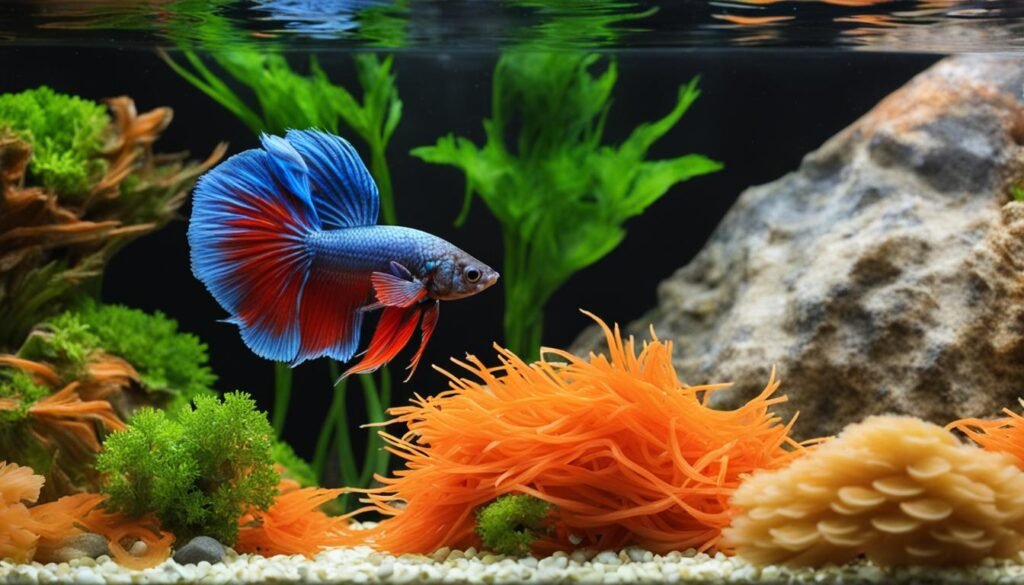
Feeding your betta fish a balanced diet is essential for their overall health and well-being. While specialized betta fish foods are formulated to provide all the necessary nutrients, it is also possible to incorporate certain human foods into their diet in moderation.
One of the human foods that betta fish can eat is carrots. Carrots are a nutritious vegetable that can be offered to bettas as a treat. However, it is important to feed carrots and other vegetables in small amounts to avoid digestive issues and overfeeding. Remember, bettas are primarily carnivorous, so the majority of their diet should consist of protein-rich foods such as brine shrimp and larvae.
If you choose to feed your betta fish carrots, make sure to cut them into small, bite-sized pieces that they can easily consume. It is also a good idea to blanch the carrots before feeding them to your betta to make them softer and easier to digest. Remember to monitor your betta’s health and adjust their diet as needed. If you’re unsure about what to feed your betta fish or have any concerns, it’s always a good idea to consult a veterinarian or knowledgeable pet store employee for specific dietary recommendations.
Benefits of Feeding Betta Fish Vegetables:
- Provides additional nutrients and variety in their diet
- May help prevent constipation
- Can be used as a treat or supplement to their regular food
Frequently Asked Questions
Here are some common questions about the diet and feeding habits of betta fish:
Can betta fish eat carrots?
Yes, betta fish can eat carrots, but they should be offered in small amounts as a treat. Carrots are a nutritious vegetable that can be incorporated into a betta’s diet, but it’s important to feed them in moderation to prevent digestive issues and overfeeding.
What is the best food for betta fish?
The best food for betta fish is a balanced diet that meets their nutritional needs. Commercial betta fish foods are formulated to provide all the necessary nutrients. These foods, such as brine shrimp and larvae, are commonly available and suitable for bettas. It’s also possible to include certain human foods, like carrots, in moderation as a treat.
How much should I feed my betta fish?
Betta fish should be given as much food as they can eat in 3 minutes, twice a day. Feeding them smaller meals multiple times a day is more beneficial than feeding them one large meal. It may take some trial and error to determine the right amount to feed your betta, but establishing a feeding routine is important.
Can betta fish eat other vegetables besides carrots?
Bettas can tolerate some vegetable matter in their diet, but it’s important to provide a balanced diet that meets their nutritional needs. Besides carrots, other vegetables that can be fed to bettas in small amounts include peas, spinach, and zucchini. However, it’s crucial to feed vegetables in moderation and avoid overfeeding to maintain their health.
Remember that betta fish have specific dietary requirements, so consulting a veterinarian or knowledgeable pet store employee for specific dietary recommendations can provide valuable guidance for your betta fish’s health and well-being.
FAQ
Can betta fish eat carrots?
Yes, betta fish can eat carrots. However, carrots should be offered in small amounts as a treat and fed in moderation to prevent digestive issues and overfeeding.
What are some other human foods that can be fed to betta fish?
Other human foods that can be fed to betta fish in moderation include shrimp, chicken, egg yolk, and pork. These animal protein sources can be offered as occasional treats.
How much should I feed my betta fish?
Betta fish should be given as much food as they can eat in 3 minutes, twice a day. Feeding smaller meals multiple times a day is more beneficial than one large meal.
Can betta fish be fed fish flakes?
Yes, betta fish can be fed fish flakes that are specifically formulated for them. These flakes should have a high protein content to meet the betta’s dietary needs.
What should I avoid feeding my betta fish?
Fruit is not a suitable addition to a betta’s diet, and there is no need to give fruit to bettas. It is important to provide bettas with a balanced diet that includes the appropriate types of food.
How do I establish a feeding routine for my betta fish?
It may take some trial and error to determine the right amount to feed your betta, but it is important to establish a feeding routine. Betta fish should be fed as much food as they can eat in 3 minutes, twice a day.
Leave a Reply